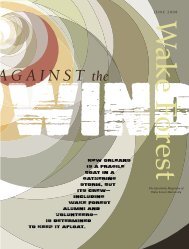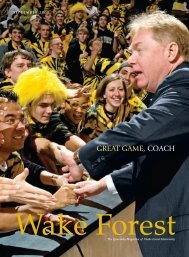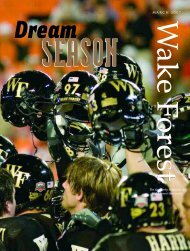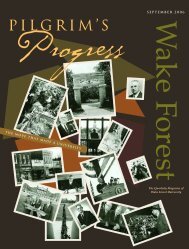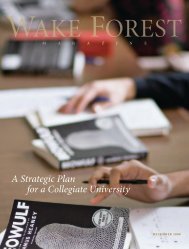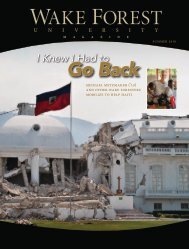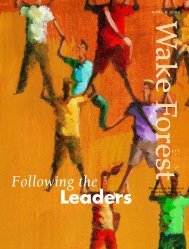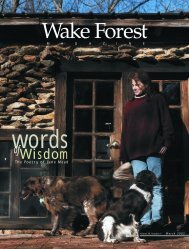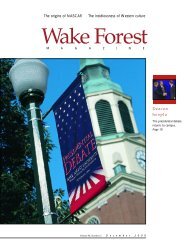Wake Forest Magazine September 2003 - Past Issues - Wake Forest ...
Wake Forest Magazine September 2003 - Past Issues - Wake Forest ...
Wake Forest Magazine September 2003 - Past Issues - Wake Forest ...
Create successful ePaper yourself
Turn your PDF publications into a flip-book with our unique Google optimized e-Paper software.
iggest industries today—the criminaljustice system, the whole spectrum ofsocial stratification in the South.”Other highlights included visits toTunica, Mississippi—the poorest countyin the poorest state in the nation, whereinfant mortality rates are extreme—and the Lorraine Hotel in Memphis,where Martin Luther King Jr., wasassassinated on March 4, 1968;a day ofvolunteering at Café Reconcile, arestaurant in New Orleans that trainslow-income people for jobs in the hospitalityindustry; a workshop at theSouthern Poverty Law Center; andmeetings with ministers, civil rightsactivists, and social service workers.Some of the students posted dailyreports of the trip on a Web page linkedfrom the University’s site. Alex Reyes(’06) confessed to feeling “comfortedand relaxed when being around peoplewho shared my heritage” when surroundedby blacks at Tuskegee Institute.“But just as you cannot develop a muscleuntil you work through the periodof pain, we will never grow as a societyuntil we can all go into zones of discomfort,”she wrote. “I don’t want tofeel the pain of our nation’s historyevery time I see a black man carrying awhite man’s bags, or cringe when I seegroup of black kids sitting towards theback of a bus.The only way we willgrow and be able to look forward is ifwe step out of comfort zones—as thistrip is providing us the opportunity todo. It is vital to understand what ourparents and grandparents had to gothrough for us to be able to have therights that we do today, but my goalnow is to be able to detach myselfenough so that I do not dwell on thepast, but look forward to what I can doin the future.”Smith hopes the course becomes amodel for similar courses built aroundtrips to inner cities, reservations, andother venues in the future. “It’s an innovativeway of teaching that presents adistinctive opportunity to us as adepartment,” he says.—David FytenIn MemoriamRhoda K. Channing,a tireless advocate of theZ. Smith Reynolds Library since being named director in1989, died on July 25 of cancer. Channing, who was 61, ledthe library through a period of expansion and a shift to newways of accessing information through technology.A native of Brooklyn, New York, Channing knew at anearly age that she wanted to be a librarian. “I felt a calling towork in libraries at age sixteen and from then on it wasnever a question what I would do with my life,” she said in an interview with<strong>Wake</strong> <strong>Forest</strong> <strong>Magazine</strong> in 2000. She studied English literature at Brooklyn Collegeand earned her master’s in library science from Columbia University and anMBA from the University of Kentucky. She worked in libraries at the Universityof North Carolina at Chapel Hill, Kentucky and Boston College before coming to<strong>Wake</strong> <strong>Forest</strong>.Channing was at the forefront in pushing <strong>Wake</strong> <strong>Forest</strong> into the electronic age,leading the library to digitize its most unique resources so researchers aroundthe world could have access to them; developing an online public access catalogthat links the Reynolds library with the libraries at the School of Medicine andthe Worrell Professional Center; and developing the ThinkPad training programfor new students.She is survived by a daughter, son-in-law and one grandchild.Memorial contributions may be made to the Rhoda K. Channing LibraryFund for library staff development, Box 7227,Winston-Salem, North Carolina,27109-7227.❖ ❖ ❖Jeanne Owen,who taught in the Calloway School ofBusiness and Accountancy for thirty-five years and was theUniversity’s first female full professor, died July 27. She was 82.“She was truly one of the pillars in the history of ourUniversity as a whole, and particularly the business school,”said Thomas Taylor, Hylton Professor of Accountancy anddean of the Calloway School from 1980–1992.Owen taught high school before enrolling in law school atthe University of North Carolina at Chapel Hill so that she could teach businesslaw on the college level.When she started teaching in what was then the Schoolof Business Administration in 1956, she was one of only six women on the faculty.She served as acting dean of women from 1962–1964. In 1967, she became thefirst woman at <strong>Wake</strong> <strong>Forest</strong> to earn the title of full professor. She was awardedthe Jon Reinhardt Award for Excellence in Teaching in 1987 and retired in 1991.A native of Gibsonville, North Carolina, Owen received her bachelor’s degreefrom the University of North Carolina at Greensboro and a master’s degree fromIndiana University. She is survived by a sister and brother.<strong>September</strong> <strong>2003</strong> 9




